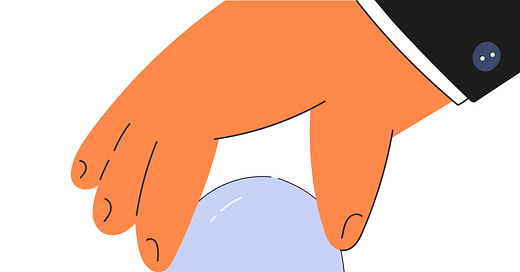What the "F" is a Patriarchal Society?
An Ongoing Series Exploring The System We Live In By Tracy Crossley
Hello there.
“Did you know women make up only 10% of Fortune 500 CEOs, despite being nearly half the workforce? Since 2018, the number of female CEOs has increased by an astounding 2500%. But even with this progress, only 52 women hold these roles—compared to 448 men.
This isn’t just coincidence—it’s a reflection of the patriarchal systems that still dominate our society.”
What the “F” is a Patriarchal System?
“A patriarchal society is one where men hold primary power across politics, economics, and family dynamics. Women may hold positions of influence, but they’re still the exception, not the norm.”
This post isn’t about excluding men or women, nor is it about pointing fingers. The reality is that very few people—regardless of gender—are positively impacted by the current patriarchal system.
So, where does this system still hold primary power? Almost everywhere:
Workplace and Economics
Politics and Government
Social and Cultural Norms
Technology and Digital Spaces
Education
Family and Personal Life
Legal Systems
Global Contexts
Each of these areas will be explored in depth in future posts.
Signs of Progress vs. Persistent Inequities
Returning to the number of female CEOs—this increase might signal progress in breaking down traditional notions that leadership is for men alone. It reflects a gradual shift toward gender equality in corporate leadership.
But this is just one small part of the story. Patriarchal systems have ruled over significant areas of influence and decision-making, effectively excluding women for centuries. Why is it so hard to change?
Because many still unconsciously believe that men can “do it better.”
For example, if my toilet breaks, I instinctively look to my husband, who happens to know plumbing. But does that mean all men can fix toilets? Absolutely not—just ask my mother. Many women own plumbing companies or work as plumbers who could fix it just as well.
This unconscious bias—the way we’ve been conditioned to look at roles—is at the heart of patriarchal systems.
Unconscious Beliefs and Exclusion
Patriarchal systems are, by nature, exclusive. Even if you climb the ladder, unless you’re part of the tiny group at the top, you’re still excluded from real power.
What if the system worked for everyone—the oppressed, forgotten, and marginalized? What if we leveraged talents and voices to build true communities? Unfortunately, instead of inclusivity, we’ve created a society stressed by systems we’re not emotionally evolved to handle. (Think of dopamine addiction to endless addiction to scrolling) —a byproduct of tech designed without emotional maturity in mind.)
This is a stressed out society. Often we blame the wrong thing.
Tracing the Roots of Patriarchy
Patriarchy didn’t start yesterday. Our ancestors said “yes” to the system through their choices, and we inherited their legacy.
Consider medieval Europe, where women were often the legal property of their fathers or husbands. Though some women owned property, independence was rare. Thousands of years ago, most women were seen as possessions under the concept of "coverture," meaning they had few rights of their own.
Sure, there have been exceptions—queens and female leaders—but history shows they are outliers.
Every time we blame “the patriarchy” without action, we stay victimized by it. And no one is a “better” victim than another. A victim is still a victim.
Looking Forward: Technology, Choice, and Change
As technology advanced, it brought conveniences like washing machines and microwaves, but it was developed within a patriarchal framework. These innovations often reinforced traditional roles rather than challenging them.
Blaming others doesn’t create change. We contribute to the status quo when we accept it through personal choices. Saying, “That’s just the way it is,” and doing nothing keeps us stuck.
Why do we accept it? Much of it comes from family. Our beliefs about ourselves and the world are unconsciously passed down. Then, as we grow, we find evidence in society that reinforces these beliefs.
Acceptance is born from unconscious expectations. Why do you prefer the clothes, the decor of your home, location you live, food you eat? Often it is through wanting some form of acceptance, so you developed expectations about what that meant.
The First Step Toward Change
Start by examining your unconscious expectations:
What beliefs were handed to you as a child?
As a child did you notice when you wanted something different than what was acceptable? What expectations developed from it?
How do they limit you or work against you?
Understanding these unconscious patterns is the first step toward dismantling patriarchal systems. It’s about undoing the psychology we’re born into and choosing a better way forward.
Next, we’ll explore how patriarchy affects our daily lives in ways you may not even realize.




